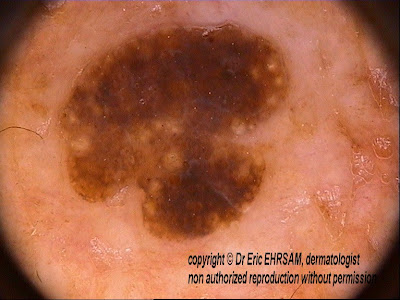 A 53-year-old woman consulted for this pigmented lesion on her back.
A 53-year-old woman consulted for this pigmented lesion on her back.Dermoscopy revealed brown structures typical of fat fingers, in favor of a seborrheic keratosis.
 Fat fingers are an important dermoscopic sign to know for diagnosing seborrheic keratosis in absence of other typical signs (milia-like kysts, comedo-like structures, fingerprint-like structures, sharp margins, hairpin blood vessels)
Fat fingers are an important dermoscopic sign to know for diagnosing seborrheic keratosis in absence of other typical signs (milia-like kysts, comedo-like structures, fingerprint-like structures, sharp margins, hairpin blood vessels)Kopf and al, "Fat fingers", a clue in the dermoscopic diagnosis of seborrheic keratoses J Am Acad Dermatol
2006;55:1089-91









































